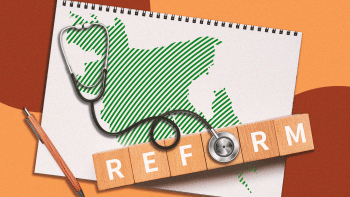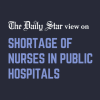Priorities for Bangladesh’s health sector

The interim government has set a reform agenda for itself. In early September, six commissions were established to address reforms in various cross-cutting areas, including the constitution, electoral system, judiciary, anti-corruption, public administration, and police. The heads and other members of each commission were also named. In mid-October, four more commissions on health, media, labour, and women were formed. The formation of these commissions has been widely welcomed, with expectations that they will lead to meaningful and lasting changes in their respective areas.
The interim government has recently completed 100 days. As expected, the demand for a "roadmap" for the transfer of power through parliamentary elections is gaining momentum. There is no concrete announcement from the government yet, but some have suggested that elections could possibly be held by December 2025. This leaves about 400 days from now. Within this short timeframe, only a few substantive reforms can be carried out. A myriad of reforms is needed, but which ones will be prioritised? In my opinion, the commissions should focus on areas that are impactful and can be meaningfully completed within the government's tenure.
One important sector requiring urgent reform is health. Public health experts have been voicing their concerns and frustrations about the state of this sector. With the new opportunities created through the July movement, there is hope for significant changes in the health sector as well. I am confident that the relevant commission will thoroughly examine the issues paralysing this sector and propose impactful reforms. Below, I outline a few ideas which, if implemented, could help the country progress towards the national goal of universal health coverage (UHC).
Investing more in health
The government spends only 0.7 percent of GDP on health which is the second lowest globally. This is circumscribed by the government's inability to spend even this meagre amount. Good health cannot be achieved without good investment and optimum spending. The commission should recommend more money for the health sector, but more importantly, how to spend the additional money for achieving UHC.
Creating accountability
There is a demand for establishing an independent National Health Security Office (NHSO), which would enhance accountability by separating the service delivery function of the Ministry of Health and Family Welfare (MoHFW) from its purchasing function.
Free drugs for all
Bangladesh has one of the highest rates of out-of-pocket (OOP) expenses in healthcare, most of which are for drugs. Despite the country's near self-sufficiency in medicines due to a thriving pharmaceutical industry and government production, free drugs and contraceptives provided through community clinics are often in short supply. Introducing free drugs within a specified timeframe could significantly reduce OOP expenses and health inequities.
Restructuring healthcare administration
The current administration under the MoHFW is divided into several directorates (DGs), many of which are artificially and irrationally created. Primary health care (PHC)—encompassing basic curative, preventive, and promotive services—is delivered at the upazila level and below, up to community clinics. Unfortunately, PHC is deprioritised under the current system, with poorly defined roles, accountability, and financing. Establishing a separate directorate general for PHC would be beneficial. Additional DGs could be created for tertiary hospitals, medical education and research, drug administration, and other areas.
Strengthening community participation through youth engagement
The July movement demonstrated the value and potential of involving youth in development. Community engagement is a critical health system building block. Management committees exist for almost every facility, from district hospitals to community clinics, with civil society members included, at least on paper. Unfortunately, most of these committees are dysfunctional and have not met in years. Introducing youth representatives could revitalise these committees. Similarly, regulatory bodies like the Bangladesh Medical and Dental Council (BMDC) could benefit from youth participation.
Regulating the private healthcare sector
The private sector now caters to over half of the population's health needs but remains largely unregulated. Since the ordinance on private healthcare was promulgated in 1982, no significant updates have been made over the past 42 years. The interim government has an opportunity to address this by revisiting and modernising regulations.
Establishing a permanent health commission
The current commission cannot address all necessary reforms within the given timeframe. Once its work is complete, it would be prudent for the interim government to establish a high-powered, independent, and permanent health commission. This body would create a national health vision, tackle corruption, and plan and monitor progress towards UHC. One important task of the permanent commission could be revisiting the health policy recommendations made by Dr Zafrullah Chowdhury and colleagues in 1990, which emphasised decentralisation and remain highly relevant for Bangladesh.
Leaving a legacy through dengue management
The spread of dengue in Bangladesh is alarming. Despite this, definitive steps to contain this preventable menace are lacking. Kolkata has successfully managed dengue—why not us? Although the interim government is preoccupied with various challenges, focused attention on this issue could save hundreds of lives and alleviate the suffering of millions. The recent focus on treating those injured during the July movement is commendable. Similarly, successful dengue management could be a lasting legacy for the interim government.
Ahmed Mushtaque Raza Chowdhury is convener of Bangladesh Health Watch and founding dean of the James P Grant School of Public Health.
Views expressed in this article are the author's own.
Follow The Daily Star Opinion on Facebook for the latest opinions, commentaries and analyses by experts and professionals. To contribute your article or letter to The Daily Star Opinion, see our guidelines for submission.

 For all latest news, follow The Daily Star's Google News channel.
For all latest news, follow The Daily Star's Google News channel. 











Comments